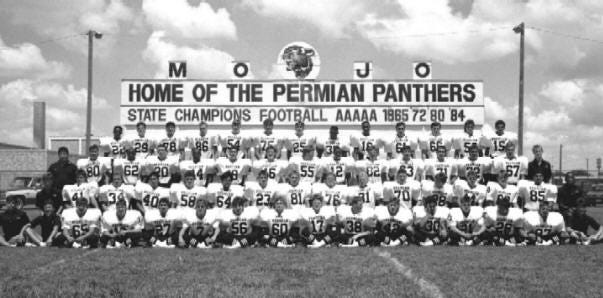

Executive Coach Joe Sinnott, Witting Partners, and the host of The Energy Detox Podcast joins Jason Spiess on This Week In Energy for a movie review on Friday Night Lights.
“Friday Night Lights,” directed by Peter Berg, is more than just a football movie—it’s a poignant reflection of the socio-economic realities of West Texas, where the oil and gas industry holds both the lifeblood and the vice grip on communities. Based on the true story of the 1988 Permian High School Panthers, the film captures not only the fierce and deeply ingrained culture of high school football in Odessa, Texas, but also how the town’s identity and power structures are intertwined with the oil and gas sector.
The film’s backdrop is unmistakably tied to the rise and fall of oil prices, which mirror the fortunes of the townspeople and, by extension, the football team. Odessa’s economy, heavily dependent on oil and gas, creates a landscape where success on the football field seems as essential as a new well producing black gold. The stadium lights don’t just illuminate a game; they cast shadows over an entire community whose prosperity and morale are often dictated by the volatile energy market.
Oil money in Odessa isn’t just wealth; it’s influence, a near-omnipotent presence that drives community decisions, funds local politics, and dictates social status. The boosters—local businessmen and oil executives—are portrayed as powerful puppeteers, their donations and pressures serving as constant reminders that winning isn’t just about school pride; it’s about sustaining an economy and lifestyle. The job security of Coach Gary Gaines, played by Billy Bob Thornton, often feels as precarious as the next well’s production figures, with every loss reflecting not just on the team but on the economic anxieties simmering beneath the surface.

Power and Money: The High Stakes of Texas Football
The film’s portrayal of power dynamics fueled by oil and gas money is strikingly accurate. In many oil towns, those who control the rigs often control the narrative. The pressure on high school athletes to perform isn’t just about scholarships or dreams; it’s a reflection of a town’s collective need for a win, a respite from the economic cycles that dominate their lives. These young players are unwittingly thrust into roles as local heroes, their performances on the field scrutinized as intensely as any market report on oil futures.
The boosters’ influence over Coach Gaines and the team speaks volumes about how money and power often go hand-in-hand in these communities. They’re not just funding the team; they’re trying to buy a sense of pride and distraction from the economic uncertainties of the oil market. The high-stakes environment parallels the oil field’s boom-and-bust cycles, where fortunes can change overnight, and so too can the social standing of the town’s leaders.

Positive Elements: Self-Respect and Honor Through Coaching
Amidst the pressures and the oil-soaked reality of Odessa, “Friday Night Lights” shines brightest in its portrayal of Coach Gaines. Despite the immense pressures from oil-fueled power brokers, Gaines manages to instill a sense of self-respect, honor, and resilience in his players. He challenges the town’s narrative that winning is everything and instead focuses on building character, teamwork, and a sense of personal dignity—qualities that transcend the scoreboard.
Gaines’s approach to coaching is a powerful metaphor for leadership within an oil and gas-driven community. Just as a good oil executive knows the importance of investing in human capital, Gaines invests in his players’ minds and spirits. His speeches remind us that even in the high-stakes world of Texas football, there are values more enduring than economic success. He teaches his players—and by extension, the town—to define themselves not just by their wins and losses but by the effort and heart they put into every moment.
The transformation of the team under Gaines’s leadership mirrors what any oil and gas professional knows about the industry: resilience, adaptability, and grit are essential for success. Just as the industry faces setbacks and challenges, Gaines’s team learns to handle their own adversities with grace. The film doesn’t shy away from the harsh realities of life in an oil town, but it also showcases how leadership and personal growth can provide a path to self-respect and honor, even when the odds are stacked against you.
Final Thoughts
“Friday Night Lights” is a raw and unflinching look at the impact of oil and gas money on small-town life and high school football. It captures the duality of the industry’s influence—both the pressures it creates and the sense of community it fosters. For oil and gas professionals, the movie serves as a reminder of the far-reaching influence of the industry, not just in economic terms but in shaping the very fabric of towns like Odessa.
Ultimately, the film’s greatest triumph lies in its depiction of Coach Gaines, whose ability to inspire and uplift his team transcends the challenges imposed by the oil-driven power dynamics of the town. “Friday Night Lights” isn’t just about football; it’s about the spirit of a community and the enduring value of leadership that prioritizes character over cash.

